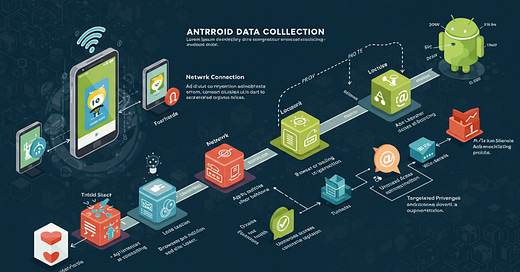Android Devices Track You—Before You Even Log In
The silent surveillance starts before you open your first app
Why This Matters
Privacy on mobile devices has always been a concern, but new research has revealed something even more unsettling—Android devices begin tracking users before they even sign in. This means that Google’s data collection starts from the moment the device connects to the internet, long before any user consents to it. Understanding how this works can help you make informed choices about your digital privacy.
What the Research Found
A team from Trinity College in Dublin conducted a study to analyze how data is stored and shared on Android devices. Their findings show that pre-installed Google services—including the Play Store and Play Services—send multiple identifiers and tracking data to Google’s servers without asking for permission.
The researchers identified at least five different types of tracking mechanisms:
Advertising analytics cookies – Used to monitor user behavior.
Tracking cookies – Persist even when users aren't logged in.
Google Android ID – A unique identifier linked to every device.
A/B testing analytics cookies – Collect data for testing different features.
Other unique identifiers – Allow Google to recognize a device across services.
Since there is no consent prompt, users have no way to opt out of this data collection.
The Persistent Google Android ID
One of the more concerning discoveries is the Google Android ID, a unique identifier created the moment a device connects to Google Play Services. Once a user logs into their Google account, this ID is permanently linked to them. Even logging out doesn’t erase it—the only way to remove the ID is by performing a full factory reset.
This persistent identifier means that Google can track a device across different accounts and reinstalls, ensuring a continuous flow of data about the user’s activities and preferences.
Limited User Control Over Tracking
Unlike web browsers, where users can clear cookies and browsing data selectively, Android does not offer a similar feature for app tracking data. The only way to clear stored data is to completely reset the app, which is the equivalent of reinstalling it. This means:
Users can’t selectively delete tracking data.
There’s no way to prevent the storage of these tracking cookies in the first place.
Even avoiding Google apps entirely doesn’t stop the tracking mechanisms built into the operating system itself.
Google's Response
When questioned about the findings, Google defended its approach, stating that these tracking mechanisms are fundamental to delivering useful products and services. However, this raises a critical issue: should users have the right to know exactly how their data is being collected and used?
What You Can Do
While Android’s built-in tracking mechanisms make it difficult to fully opt out, there are still steps you can take to limit exposure:
Use a privacy-focused Android ROM – Custom ROMs like GrapheneOS or CalyxOS strip out Google tracking services.
Disable Google Play Services (if possible) – Some Android versions allow users to limit background data collection.
Adjust ad personalization settings – In Google settings, disable “Ad Personalization” to reduce targeted tracking.
Use privacy-focused apps – Alternatives like DuckDuckGo, ProtonMail, and F-Droid reduce dependence on Google services.
The Bigger Picture
Google’s deep integration across mobile devices, search, and advertising gives it an unparalleled ability to collect data at every level. The fact that tracking begins before users even log in highlights the need for stronger transparency and user control. Without meaningful options to opt out, users are left in a system where privacy takes a backseat to data collection.
Protect Your Digital Privacy
Staying aware of these hidden tracking mechanisms is the first step to reclaiming your online privacy. Take control by exploring alternative tools, adjusting your settings, and demanding greater transparency from tech companies.
Get your free personal cybersecurity & privacy assessment here
Stay secure, stay confident—CyberLife Coach is here to guide you every step of the way!




